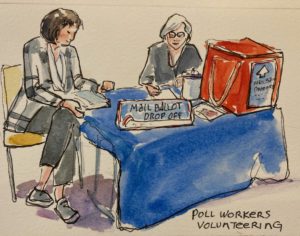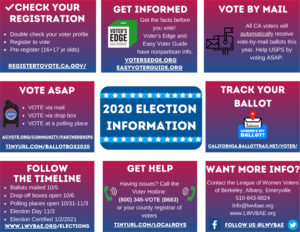Vote smarter, please!
 Why be a voter at all? It’s confusing. Does it make any difference anyway? Yes, voting matters. Do you want your school board to ban books or discussion of certain topics? Or do you want teachers to focus on teaching critical thinking skills by presenting controversial topics and helping kids think for themselves? Your vote for in school board elections determines who decides. At every level of government, decisions are being made that impact your life. Fundamental rights are being defined and expanded or limited by Supreme Court justices appointed and approved by the president and Senate – all elected officials. The people making decisions about housing, transit, and climate action are the people that WE elect. If we choose different people, we get different outcomes. So, how do you become an educated voter? Step one: register to vote. It’s easy. If you live in San Diego, go to SDVote.com. If you live somewhere else, look up your Registrar of Voters. Just to be sure, do it TODAY! In general, there are three types of elections: primary, general, and special. The primary election determines who the candidates will be in the general elections that are held every two years in November. Not every office has a primary – some are just in the general election. Special elections can happen at any time to fill vacancies, for example, when an official dies or leaves office for another reason. Once you are a registered voter, you should receive information about specific elections that you are eligible to vote in.
Why be a voter at all? It’s confusing. Does it make any difference anyway? Yes, voting matters. Do you want your school board to ban books or discussion of certain topics? Or do you want teachers to focus on teaching critical thinking skills by presenting controversial topics and helping kids think for themselves? Your vote for in school board elections determines who decides. At every level of government, decisions are being made that impact your life. Fundamental rights are being defined and expanded or limited by Supreme Court justices appointed and approved by the president and Senate – all elected officials. The people making decisions about housing, transit, and climate action are the people that WE elect. If we choose different people, we get different outcomes. So, how do you become an educated voter? Step one: register to vote. It’s easy. If you live in San Diego, go to SDVote.com. If you live somewhere else, look up your Registrar of Voters. Just to be sure, do it TODAY! In general, there are three types of elections: primary, general, and special. The primary election determines who the candidates will be in the general elections that are held every two years in November. Not every office has a primary – some are just in the general election. Special elections can happen at any time to fill vacancies, for example, when an official dies or leaves office for another reason. Once you are a registered voter, you should receive information about specific elections that you are eligible to vote in.  You will see and hear ads, and get lots of mailings and other communications about candidates and issues. Read and listen carefully. Always look at the source, follow the money, and consider what their agenda might be. Mailings must include “paid for by.” Look up any organization you don’t recognize to see who’s behind it. Fact check and talk to knowledgeable friends and colleagues. Consider setting up a potluck discussion group to share information and opinions.
You will see and hear ads, and get lots of mailings and other communications about candidates and issues. Read and listen carefully. Always look at the source, follow the money, and consider what their agenda might be. Mailings must include “paid for by.” Look up any organization you don’t recognize to see who’s behind it. Fact check and talk to knowledgeable friends and colleagues. Consider setting up a potluck discussion group to share information and opinions.  Nonpartisan organizations, like the League of Women Voters, offer objective information. The League studies issues and offers pros and cons for major ballot questions. They post candidate statements and studies on the VotersEdge.org website. The League never endorses candidates but takes positions on some ballot questions. Go to candidate forums and hear directly from the candidates. A challenger with no track record can easily promise to solve difficult problems but may not really understand the legalities and complexities that an incumbent must address. Look beyond specific issues to the candidate’s character, values, and experience. You don’t know what might arise in the future. Past actions speak louder than empty words. No candidate will be perfect. Choose the ones that you think will take us in the general direction you want, or at least the one who isn’t going to take us in a direction you don’t want. “Confirmation bias” makes us inclined to accept information that matches existing beliefs and reject conflicting views. Think critically. Vote wisely. The health and well-being of our families, our communities, and our nation depend on it.
Nonpartisan organizations, like the League of Women Voters, offer objective information. The League studies issues and offers pros and cons for major ballot questions. They post candidate statements and studies on the VotersEdge.org website. The League never endorses candidates but takes positions on some ballot questions. Go to candidate forums and hear directly from the candidates. A challenger with no track record can easily promise to solve difficult problems but may not really understand the legalities and complexities that an incumbent must address. Look beyond specific issues to the candidate’s character, values, and experience. You don’t know what might arise in the future. Past actions speak louder than empty words. No candidate will be perfect. Choose the ones that you think will take us in the general direction you want, or at least the one who isn’t going to take us in a direction you don’t want. “Confirmation bias” makes us inclined to accept information that matches existing beliefs and reject conflicting views. Think critically. Vote wisely. The health and well-being of our families, our communities, and our nation depend on it.